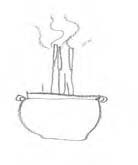Jane Vejjajiva (3 page)
Authors: Unknown

r
Kati no longer remembered Mother’s face.
The destination Grandpa chose, on the basis of his rumbling stomach, was the little waterside shelter under the big East Indian walnut tree.
This was their usual rest stop on trips to the field, because it was so well placed. The lone walnut tree stood at the edge of the field, its broad canopy left to grow freely and gracefully, casting a convenient shade over the dilapidated roof of the old shelter. The thick planks of the shelter still held good, though they creaked and squeaked with every step, sounding like an elderly person greeting a long-awaited visitor. The gentle sunshine filtered through the leaves and branches of the walnut tree. Sunlight penetrated a hole in the roof, falling on the raised wooden platform below. Grandpa gave the platform a cursory wipe, before spreading out his long cotton scarf for them to sit on like a picnic rug. Kati opened the basket Grandma had packed for them: rich sweet chili sauce, crispy fried catfish salad, sweet pork, and salted eggs which they mixed with rice and finished off, with Grandpa muttering that it was for this reason and no other that he loved Grandma.
There was not even time for their eyelids to grow heavy after the big meal before they heard someone hailing them from across the water. A number of boats were heading towards them. Headman Boon was bringing the villagers to meet with Grandpa. They had not made an appointment, but Grandpa was their counsel in times of trial, and everyone in the district was courteous and considerate to him. Word spread quickly in the little community when Grandpa was out and about, and the old shelter was a convenient meeting place for those who wished to consult him.
Tong was a member of the deputation too. He gestured for Kati to come over to him while the grownups talked. But Kati liked to hear Headman Boon’s introductory remarks. He always said the same thing: that the village by the water was indeed lucky that Grandpa had chosen to return from Bangkok and retire to his ancestral home, which at the time had been left completely deserted and had fallen into disrepair; that Grandpa, who had studied abroad and was a first-class lawyer, was well-known throughout his home and, indeed, the entire kingdom; that Grandpa had made a fortune but had helped so many people; that if it had not been for Grandpa the villagers would have been exploited, taken advantage of, and the land of their ancestors… Here Grandpa raised his hand to stop the flow of words and asked smoothly if they were planning to conduct the
Kwan Narc
recital, that part of the Buddhist ordination ceremony where the ordinand recalls his debt of gratitude to his mother for conceiving him, bearing him and delivering him. Grandpa asked if they would like to include the nine months he spent inside
his
mother’s womb in their recitation. This raised a shout of laughter that could be heard clear across the water.
Kati slipped away. Behind the shelter, steps led down to the water, and Kati sat swinging her legs, letting her toes dip into the water. Tong was never able to sit idle and he had made a toy boat that floated on the water for Kati, a bit of coconut husk with leaves stuck in it as a mast and sails. They raced their boats, thrashing the water with their hands to make them go faster. If they went so far from the shelter that not even a long stick could reach them, then Tong would swim for them. He was a good swimmer who could stay underwater for long periods. But if you were comparing Tong to a fish, you’d have a hard time finding one whose white teeth were the first thing you saw as it came out of the water. When they were tired they sat and rested. Tong liked to ask Kati about stories she was reading or had just read. He said he couldn’t understand why when he read them himself they were nowhere near as exciting.
It was a long time before the deputation left, and the sun was slowly setting when Kati walked back into the shelter. Grandpa was folding a letter and replacing it in an envelope. His face, when he looked up at Kati, seemed drained and weary, not unlike the old shelter which had seen sun and rain and so much of the world that every fibre of wood was steeped in the past and no longer had any hope for the future.
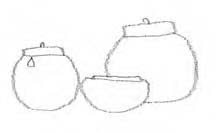
Kati wanted Mother to pick her up from school sometimes.
Kati never tired of reading
The House of Sixty Fathers
. It was the story of a child orphaned in a war in China, and a fat pig whose owner had named it ‘Glory of the Republic’. The story ended with the pig and the boy meeting sixty American soldiers. Kati loved this story. Grandpa had read it aloud to her until his voice was hoarse while he was waiting for Kati to learn to read it herself. And it was because of this book that Kati liked to call her home on the water ‘The House of Sixteen Jars’.
There were almost too many of these big water storage jars. Still, there was a reason behind each one of the sixteen, according to Grandma’s hygiene principles. The jars were strictly segregated according to their function: drinking water, washing water, cooking water. No mixing was allowed. Grandpa scratched his head wondering what the difference was. Whether the water went down your throat or washed your feet, it was all the same to him. But Grandma stood her ground. It was not the same. Cooking water went in the big dragon jar in the kitchen. Washing water went in the huge cement jar under the house (quite a spacious area as the house was the old-fashioned kind built on stilts). As for the jar that held the drinking water, that was the most special. It went under the rain pipe and the water in it was then boiled, decanted into bottles and drunk to quench your thirst. Grandpa said that for goodness sake there was such a thing as tap water, and why did Grandma have to create more housework for herself? Fortunately Grandma didn’t hear this remark.
Kati’s favourite jar was a small ceramic one decorated with dragons. It looked precious, unlike the earthenware ones which were sold door-to-door from a loaded boat on the waterway. This jar was glazed inside and out. Inside it was a shade of blue-green Grandpa called ‘crow’s egg green’. On the outside was the dragon pattern. Most importantly it had a lid, and Grandma used it to store rice. When it was filled with rice, it was too heavy for one person to lift.
By the stairs was a little water jar. This was for washing your feet, before you came upstairs from the yard or the area underneath the house. Along the path to the road there was a big open jar in which Grandpa grew water lilies, raised with his own hands. Yes, when you counted them all, there were at least sixteen jars. At the end of the rainy season they washed out the jars that held the drinking water before closing them up, ready to refill the following year. Kati liked to climb inside one of them and feel the cool earthenware against her skin. The biggest jar had plenty of room for Kati to make herself comfortable and it made a great hiding place known only to Kati. Grandpa never knew that Kati overheard him say to someone on the phone, ‘… so you want to wait till the end of the school term? Do you really think we have that much time?’
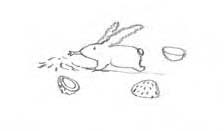
Kati wanted to see Mother carrying the shopping home from market.
‘Good timing! I could do with an extra pair of hands right now,’ Grandma greeted Tong as he entered the kitchen.
Earlier that morning, Grandma had made a big pot of pork curry to offer the monks for the meal they took before noon, their last meal for the day. She said it was her New Year offering, even though Grandpa reminded her that, in these parts, people made their big offering at the Songkran water festival in April. Grandma retorted that it wouldn’t hurt to make the offering now, just in case they happened to be some
where else at that time, and anyway whose business was it when she felt moved to make an offering.
Tong was dutifully returning one of Grandma’s cooking pots from the temple. Grandma pointed to the coconut scraper, known to the villagers as a ‘scraping rabbit’, in the corner of the kitchen next to a pile of split coconuts. Tong grasped the scraping rabbit and the basin of coconuts and briskly made his way to the yard area under the house. The shredded coconut would be squeezed and strained for its sweet white coconut milk – called
ka-ti
in Thai – which was an important ingredient in pumpkin dessert. Grandma’s voice followed him downstairs, calling to him to leave her a couple of coconuts. She would scrape them extra finely herself later to garnish her steamed rice cakes.
Kati had often wondered why the coconut scraper was called a ‘rabbit’. Whichever way she looked at it, the scraper looked nothing like a rabbit with long ears. Finally she’d decided that the metal plate which did the actual scraping had teeth which stuck out like the buck teeth of a rabbit. Tong was an expert at this task. You could tell from the way he crouched with one knee on the body of the rabbit and the other touching the floor, smiling as he spun the coconut shells with a fluid movement. His white teeth and the teeth of the scraping rabbit gave them something in common.
The evening meal passed quietly in contrast to the bustle of the afternoon. The breeze from the river was so cold it stung your skin as it, too, made a final salute to the passing of the old year. The huge moon beamed down on them, showing off its beauty, and Kati could see the rabbit in the moon quite clearly. The three people on the verandah gazed up at the moon as if spellbound. Grandpa said, quite casually, that wherever people were, they still looked up at the same moon.
Kati knew that Grandpa meant one person in particular was looking up at the moon right now, just as they all were. The one person that Kati’s heart yearned for with every breath she took.
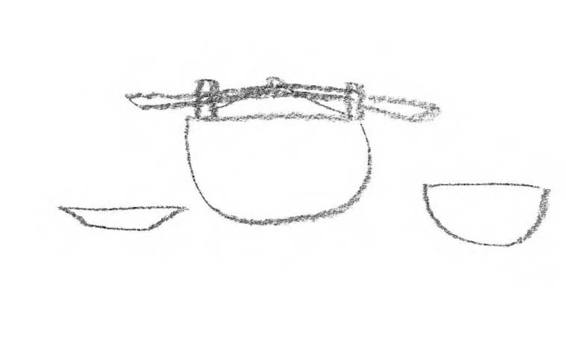
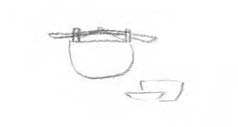
Kati wondered if Mother ever thought of her.
Grandpa called Grandma’s pot-scourer his ‘wishspurner’. Grandma spurned Grandpa’s wishes and refused to buy an electric rice cooker. ‘The world has progressed, you know,’ Grandpa’s voice sounded loudly from the kitchen door, and he stalked out shaking his head. He muttered to Kati that Grandma was worried that the villagers would not accept her as one of them, but she should know that all the villagers hereabouts plugged in an electric appliance to cook their rice.
It was clear that Grandma hadn’t always been a housewife. Grandpa said it’d only taken her a couple of years to crack the role, and now there was no trace of the personal secretary to the executive director of a five-star hotel that she had once been.

Grandpa felt constantly frustrated by Grandma’s making life difficult for herself. Sometimes Kati felt Grandma was scared of not having enough to do. She always had a project on the go in the kitchen, making sweet desserts to give to the monks when they came in the morning bearing their alms bowls. Grandpa said it wasn’t that Grandma was such a great cook, more that she invested in quality ingredients that did the trick.
Kati always had wonderful snacks and sweets to fill up on after school. If she had to do homework or prepare for an exam, she didn’t have to lift a finger, Grandma would place the snacks right by her. Or else Grandma would store them in a row of big glass jars for her to choose from, just like in Uncle Chiang’s store at the bus stop. Kati wasn’t bothered by exams though she liked to get them out of the way as soon as possible. The holidays looked promising this year, with lots of fun activities. First would be stargazing. Grandpa had given her a telescope and a map of the constellations for New Year. She hadn’t even taken the telescope out of the box yet. Kati wanted to go on the special camp the school had organised, but she’d have to ask Grandpa’s permission when Grandma was in a good mood. If Grandma disagreed with Grandpa, there was a big chance that Kati would miss out on going to camp.
Or then again maybe Kati would go birdwatching with Tong. Mostly they watched waterbirds or birds that lived on the edges of the fields. Tong carried his sketchbook everywhere, and when he saw a bird he’d sketch it and then compare it later with a reference book to find out what bird it was. Grandpa encouraged him in this, frequently getting him bird books from overseas. Everyone in the house counted Tong as a member of the household and Kati often suspected that, as well as helping out with the chores, Tong must have done some great favour for Grandma and Grandpa in the past.
The rice was boiling in its pot on the stove. Kati looked for the pot-scourer to wipe up the rice water that had frothed over. She also needed to use it to tilt the pot over on one side so the remaining water would boil away, leaving the rice fluffy and dry. It couldn’t be that difficult, she had seen Grandma do it so often.
Just then Grandma hurried into the kitchen. Her gaze swept the room as she complained that she couldn’t find the pot-scourer. Kati could only look at her in amazement. Couldn’t Grandma see that she was holding it in her own hand instead of complaining she couldn’t find it? When Kati told her where it was, Grandma seemed greatly put out, and sent Kati off to set the table.
These days Grandma’s thoughts were often elsewhere.
